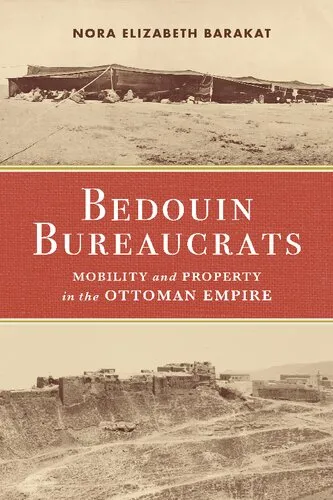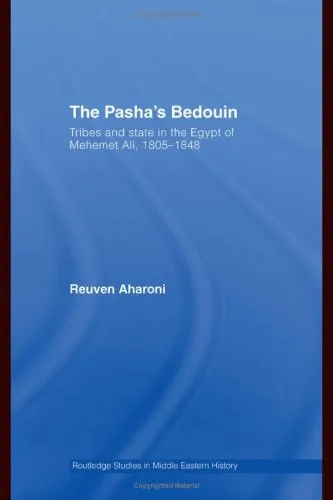Bedouin Bureaucrats: Mobility and Property in the Ottoman Empire
4.0
بر اساس نظر کاربران

شما میتونید سوالاتتون در باره کتاب رو از هوش مصنوعیش بعد از ورود بپرسید
هر دانلود یا پرسش از هوش مصنوعی 2 امتیاز لازم دارد، برای بدست آوردن امتیاز رایگان، به صفحه ی راهنمای امتیازات سر بزنید و یک سری کار ارزشمند انجام بدینکتاب های مرتبط:
معرفی کتاب "Bedouin Bureaucrats: Mobility and Property in the Ottoman Empire"
کتاب Bedouin Bureaucrats: Mobility and Property in the Ottoman Empire نوشته نورا برکات یکی از جامعترین مطالعات تاریخی و تحلیلی در مورد زندگی اجتماعی، شرایط حقوقی، و تحول مفهوم مالکیت در امپراطوری عثمانی به شمار میرود. این اثر به بررسی شرایط بومیان بیابانی، به خصوص بدویان، و روشهای بوروکراتیک ارتباط آنها با دستگاه حکومتی عثمانی پرداخته و نگاهی نوین به تعاملات قانونی، اقتصادی و انسانی این دوران میاندازد.
خلاصهای از کتاب
این کتاب در چند بخش عمده به موضوع ارتباط میان تفکر بوروکراتیک و سازوکارهای زیست بومیان بدوی در دوران عثمانی میپردازد. نورا برکات از منابع تاریخی گستردهای بهره گرفته تا نشان دهد چگونه بدویان که غالباً با هویت سیاسی محلی شناخته میشوند، در سازوکار دولت عثمانی وارد شدند و تعاملاتی حقوقی و اقتصادی قابل توجهی با دولت مرکزی برقرار کردند.
این پژوهش نه تنها بر جنبههای اجتماعی و اقتصادی تأکید دارد بلکه نقش نهادهای حکومتی عثمانی در بازتعریف مفهوم "مکان" و "حرکت" را نیز تحلیل میکند. برای نمونه، مالیات، ارزیابی مالکیت زمین، و روشهای ساماندهی و نظارت بر قبایل بدوی از بخشهای کلیدی تحقیق در کتاب هستند. در طول متن، دیده میشود که چگونه دولت عثمانی با تلفیق سیستمهای قانونی و بوروکراتیک، توانست کنترل بیشتری بر مناطق دورافتاده داشته باشد، در حالی که بدویان نیز نقشی پویا در این فرایند داشتند.
دلایل اهمیت کتاب
کتاب Bedouin Bureaucrats با ارائه روایتی دقیق از تعاملات اجتماعی و قانونی در یکی از امپراطوریهای مهم اسلامی، نه تنها پاسخی به بسیاری از سوالات مربوط به تاریخ عثمانی داده، بلکه الگویی کاربردی برای تحلیل روابط میان بوروکراسی و جامعه محلی فراهم میآورد. این اثر کمک میکند تاریخی اجتماعی و اقتصادی بدویان را در مرکز توجه قرار داده و به جای دیدگاهی استعماری غالب، توضیح دهد که چگونه آنها در مسیر تاریخ نقش فعال و موثر داشتهاند.
نورا برکات با ترکیب دادههای حقوقی و منابع تاریخی منطقهای، مطالعهای بسیار دقیق انجام داده که شایستگی مطالعه عمیق در حوزههای گوناگون تحقیقات خاورمیانه، انسانشناسی قانونی و اقتصاد تاریخی را به نمایش میگذارد. این کتاب همچنین به پژوهشگرانی که به ترکیب دادههای حقوقی با تاریخ اجتماعی علاقهمندند، راهنمایی زیادی میکند.
نکات کلیدی این کتاب
- بررسی تعاملات حقوقی میان دولت عثمانی و بدویان در مناطق بیابانی.
- تحلیل ریشههای تاریخی مفهوم مالکیت زمین در سیستم قانونی عثمانی.
- پرداختن به رابطه بین حرکت قبایل و کنترل بوروکراتیک دولت.
- ارائه دیدگاهی جدید درباره ارتباط میان بوروکراسی امپراطوری و جوامع محلی.
نقل قولهای معروف از کتاب
"حرکت نه تنها به عنوان یک ویژگی اجتماعی بدویان، بلکه به مثابه یک الگوی مقاومت در برابر کنترل مرکزی دولت قابل تحلیل است."
"مالکیت زمین در امپراطوری عثمانی مفهومی ایستا نبود بلکه به واسطه بوروکراسی و شرایط محلی تحول یافت."
چرا این کتاب مهم است؟
اثری که نورا برکات ارائه کرده، فراتر از یک تاریخ عمومی است. این کتاب قادر است پژوهشگران را به بازنگری در تعاریف و مفاهیم رایج درباره مالکیت، حرکت و بوروکراسی وادارد. همچنین از آنجایی که تحلیلهای ارائهشده در کتاب مبتنی بر اسناد دست اول و منابع متنی عمیق هستند، اهمیت بسیار زیادی برای مورخان و انسانشناسان دارد.
با شناختی عمیق از روشهای حکمرانی و سازماندهی اجتماعی در امپراطوری عثمانی، این اثر به ما کمک میکند روابط پیچیده میان دولتها و جوامع محلی را بهتر فهمیده و با دیدی بازتر به تاریخ اجتماعی و اقتصادی منطقه بنگریم.
Welcome to the comprehensive introduction to Bedouin Bureaucrats: Mobility and Property in the Ottoman Empire, a groundbreaking book authored by Nora Barakat. In this work, I delve into the intersections of governance, mobility, land use, and property relations within the late Ottoman Empire, specifically focusing on Bedouin communities often overlooked in histories of the region. This book challenges conventional narratives that situate Bedouin societies merely on the margins of empires and states, presenting instead a nuanced picture of their engagement with Ottoman bureaucratic and legal systems.
Detailed Summary of the Book
Bedouin Bureaucrats explores the complex and dynamic relationship between nomadic Bedouin groups in the Ottoman Empire and the state apparatus they encountered during the late 19th and early 20th centuries. Drawing on rich archival sources, I examine how Bedouins engaged with imperial institutions, negotiated property claims, and navigated Ottoman governance structures. Far from the stereotypical image of ungovernable nomads disconnected from sedentary societies, Bedouins often operated as active participants in the Ottoman administrative system.
The book focuses on regions of the Ottoman Empire where mobility and fluid conceptions of property were particularly significant—principally in Greater Syria and the Arabian Peninsula. I consider the ways property rights extended beyond fixed land boundaries, integrating concepts of movement and resource sharing. By analyzing Ottoman court records, tax registers, and administrative reports, my research uncovers the ways Bedouin practices shaped and were reshaped by imperial power. Within these interactions, Bedouin groups both resisted and co-opted bureaucratic mechanisms to protect their grazing lands and preserve their way of life.
A key case study is the examination of property disputes and how Ottoman authorities adapted existing legal norms to address mobile populations. Another focus is on the technologies of governance—such as cadastral surveys or documentation practices—that mediated relations between the state and its nomadic subjects. Ultimately, the book reveals how the supposed binaries of sedentary versus nomadic and empire versus periphery were far more interconnected than previously imagined.
Key Takeaways
- Bedouins actively participated in Ottoman state structures and were not simply passive recipients of imperial policies.
- Concepts of property and mobility in the Ottoman Empire were deeply intertwined, challenging modern notions of static, bounded ownership.
- The Ottoman state tailored its bureaucratic practices to account for the realities of mobile populations, demonstrating a flexible governance style.
- Marginalized groups like the Bedouins played a central role in shaping the practices and policies of the Ottoman administration.
- The history of the Ottoman Empire cannot be fully understood without accounting for the interplay between nomadic and sedentary societies.
Famous Quotes from the Book
"To understand the Ottoman Empire’s system of governance, one must also understand how it moved with its people: its bureaucrats, its soldiers, its records, and its Bedouins."
"Property in mobility requires a view of land not as a bounded, sedentary space, but as a fluid and functional network connecting people, goods, and capital."
"The Bedouin world was not peripheral to empire; rather, it was integral to the Ottoman state’s visions of sovereignty, security, and survival."
Why This Book Matters
Bedouin Bureaucrats fills a critical gap in the historical scholarship on the late Ottoman Empire by centering the experiences of communities traditionally deemed peripheral or outside state governance. In doing so, it challenges entrenched assumptions about nomadic societies and their supposed incompatibility with bureaucratic systems. By shedding light on the ways Bedouins and Ottoman authorities negotiated power and property, the book expands our understanding of empire as a dynamic and negotiated process.
Additionally, the book offers a fresh analytical framework for approaching questions of mobility, property, and governance in other historical and geographical contexts. With its focus on legal pluralism, contested sovereignties, and the adaptability of bureaucratic systems, it speaks to broader themes of how empires and states incorporate diverse populations into their fold. It is an essential read for historians, anthropologists, and anyone interested in Middle Eastern studies, Ottoman history, or the broader dynamics of state control and mobility.
دانلود رایگان مستقیم
You Can Download this book after Login
دسترسی به کتابها از طریق پلتفرمهای قانونی و کتابخانههای عمومی نه تنها از حقوق نویسندگان و ناشران حمایت میکند، بلکه به پایداری فرهنگ کتابخوانی نیز کمک میرساند. پیش از دانلود، لحظهای به بررسی این گزینهها فکر کنید.
این کتاب رو در پلتفرم های دیگه ببینید
WorldCat به شما کمک میکنه تا کتاب ها رو در کتابخانه های سراسر دنیا پیدا کنید
امتیازها، نظرات تخصصی و صحبت ها درباره کتاب را در Goodreads ببینید
کتابهای کمیاب یا دست دوم را در AbeBooks پیدا کنید و بخرید
1254
بازدید4.0
امتیاز50
نظر98%
رضایتنظرات:
4.0
بر اساس 0 نظر کاربران
"کیفیت چاپ عالی بود، خیلی راضیام"



